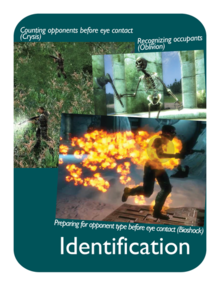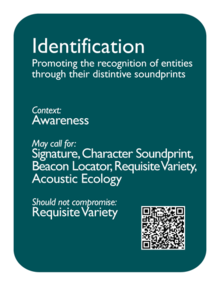Difference between revisions of "Identification"
ValterAlves (Talk | contribs) m |
ValterAlves (Talk | contribs) m |
||
| Line 21: | Line 21: | ||
In terms of [[Gameplay]], the kind of [[Awareness]] provided by [[Identification]] is especially relevant when in absence of visual contact with the emitting source.<br /> | In terms of [[Gameplay]], the kind of [[Awareness]] provided by [[Identification]] is especially relevant when in absence of visual contact with the emitting source.<br /> | ||
| − | [[Beacon Locators]] constitute one further exploration that exaggerates the acoustic presence of an entity to make it more noticed and localizable.<br /> | + | [[Beacon Locator|Beacon Locators]] constitute one further exploration that exaggerates the acoustic presence of an entity to make it more noticed and localizable.<br /> |
| − | In games that support [[Stealth]] behaviour or that are open-world enough to provide alternative | + | In games that support [[Stealth]] behaviour or that are open-world enough to provide alternative roaming, [[Identification]] of NPC is instrumental. |
In all cases, the adoption of [[Signature]] soundprints, by definition, contributes to [[Identification]] and allows refined reaction. For instance, if different types of opponents have distinctive [[Chitchat]] or [[Foley]], the player can readily draw up the appropriate weapons, before eye contact. | In all cases, the adoption of [[Signature]] soundprints, by definition, contributes to [[Identification]] and allows refined reaction. For instance, if different types of opponents have distinctive [[Chitchat]] or [[Foley]], the player can readily draw up the appropriate weapons, before eye contact. | ||
| − | + | The issue of [[Requisite Variety]], which concerns the perception of repetition, becomes more complex when different entities are not all treated alike, as it is the case implied by [[Identification]]. In this case [[Requisite Variety]] applies not only among the all set of entities but also for each particular kind of entity. | |
| + | | examples= | ||
| ex1=<mt p="Identification" g="Bioshock" h="140">Big Daddies' Character Soundprint allows their Identification before Eye Contact. This is important because unlike many other NPC in the game, the player wants to find them. Prompt Identification of the specific type of enemy is crucial in this game due to the need of timely selecting readying the proper weapons. This is possible thanks to their Signatures. For instance Spider Slicers are very quick, attack from the roof, and only a certain characteristic sound allows to spot them before actual eye contact.</mt> | | ex1=<mt p="Identification" g="Bioshock" h="140">Big Daddies' Character Soundprint allows their Identification before Eye Contact. This is important because unlike many other NPC in the game, the player wants to find them. Prompt Identification of the specific type of enemy is crucial in this game due to the need of timely selecting readying the proper weapons. This is possible thanks to their Signatures. For instance Spider Slicers are very quick, attack from the roof, and only a certain characteristic sound allows to spot them before actual eye contact.</mt> | ||
| ex2=<mt p="Identification" g="Oblivion" h="140"></mt> | | ex2=<mt p="Identification" g="Oblivion" h="140"></mt> | ||
Revision as of 00:13, 18 August 2011

|

| |
| The card's front face | The card's back face |
Contents
Synopsis
| Promoting the recognition of entities through their distinctive soundprints. |
Relationships
Context:
Awareness ![]() .
.
May call for:
Signature ![]() , Character Soundprint
, Character Soundprint ![]() , Beacon Locator
, Beacon Locator ![]() , Requisite Variety File:M385px-RequisiteVariety-front-v20.png, Acoustic Ecology
, Requisite Variety File:M385px-RequisiteVariety-front-v20.png, Acoustic Ecology ![]() .
.
Should not compromise:
Requisite Variety File:M385px-RequisiteVariety-front-v20.png.
Description
Identification refers to the ability to associate soundprints with their source entities – be they NPC, resources, or other objects in the world.
In the case of characters, Identification consists in the perception of their Character Soundprint.
Identification potentiates accurate behaviour, reduces ambiguities and sets the context that in turn allows to complete their representation.
In terms of Gameplay, the kind of Awareness provided by Identification is especially relevant when in absence of visual contact with the emitting source.
Beacon Locators constitute one further exploration that exaggerates the acoustic presence of an entity to make it more noticed and localizable.
In games that support Stealth behaviour or that are open-world enough to provide alternative roaming, Identification of NPC is instrumental.
In all cases, the adoption of Signature soundprints, by definition, contributes to Identification and allows refined reaction. For instance, if different types of opponents have distinctive Chitchat or Foley, the player can readily draw up the appropriate weapons, before eye contact.
The issue of Requisite Variety, which concerns the perception of repetition, becomes more complex when different entities are not all treated alike, as it is the case implied by Identification. In this case Requisite Variety applies not only among the all set of entities but also for each particular kind of entity.
Examples
  Bioshock: Big Daddies' Character Soundprint allows their Identification before Eye Contact. This is important because unlike many other NPC in the game, the player wants to find them. Prompt Identification of the specific type of enemy is crucial in this game due to the need of timely selecting readying the proper weapons. This is possible thanks to their Signatures. For instance Spider Slicers are very quick, attack from the roof, and only a certain characteristic sound allows to spot them before actual eye contact.
|




